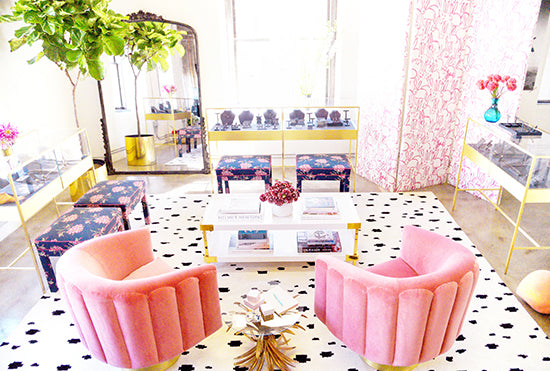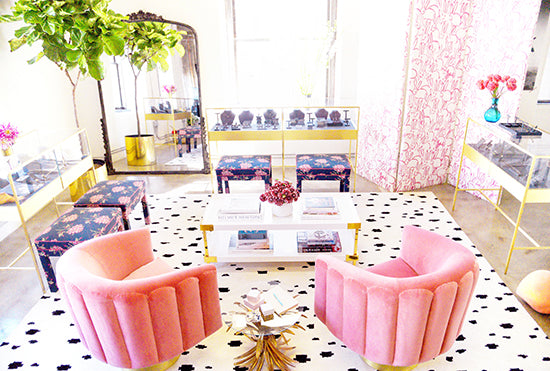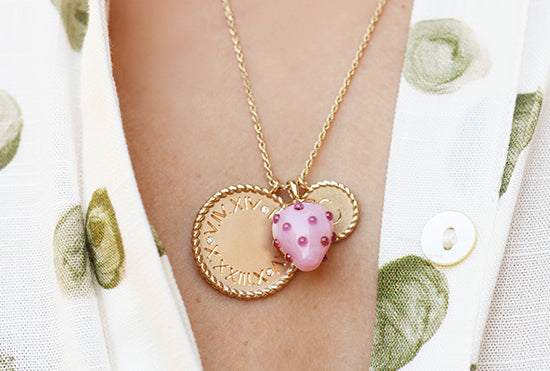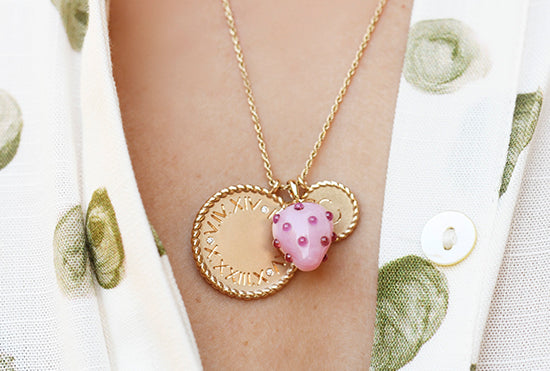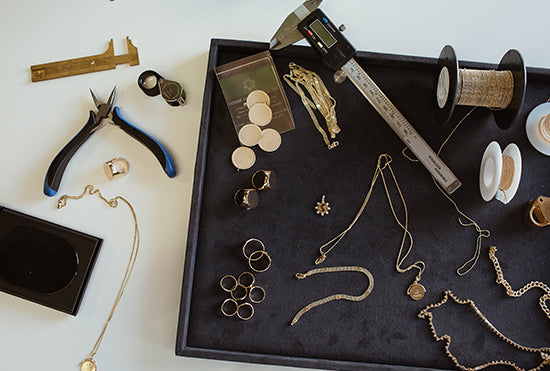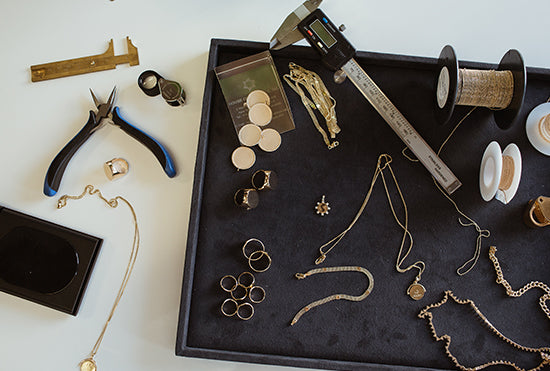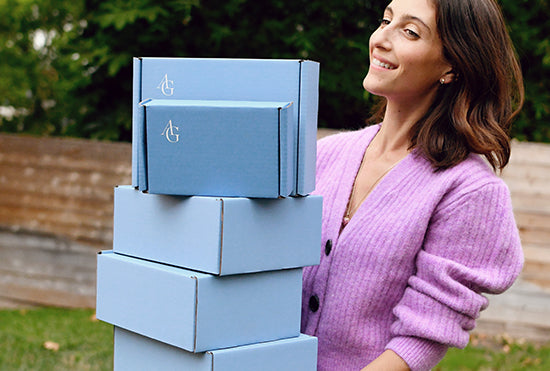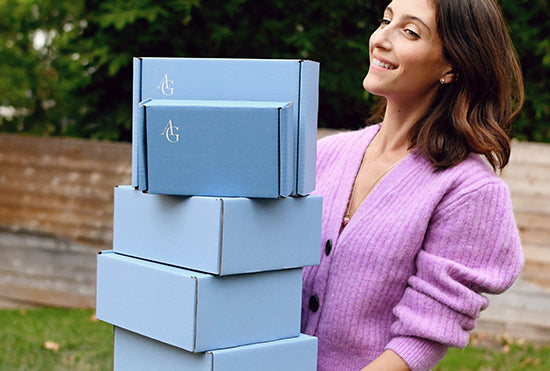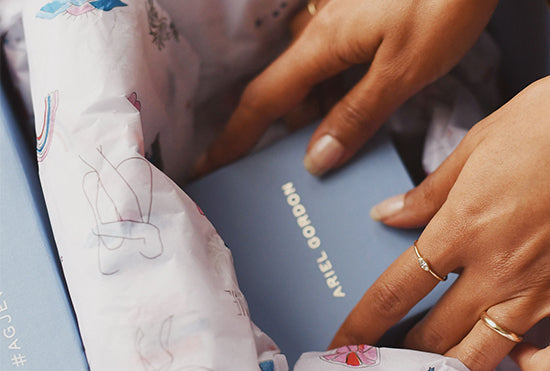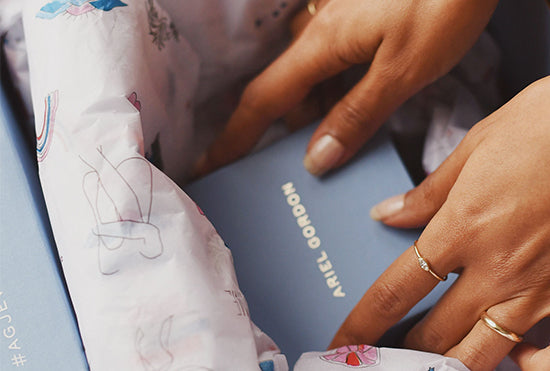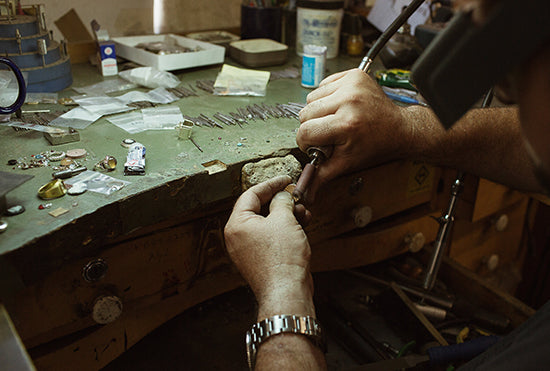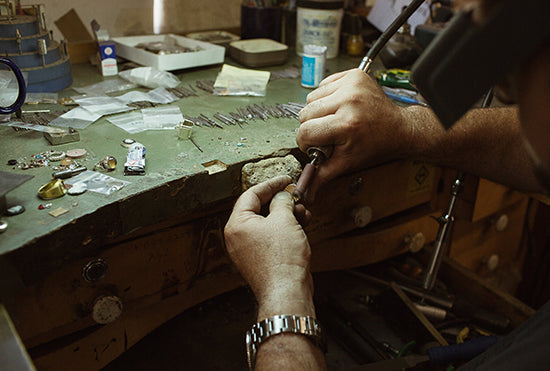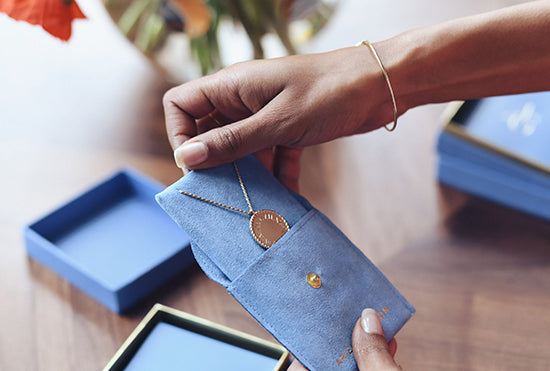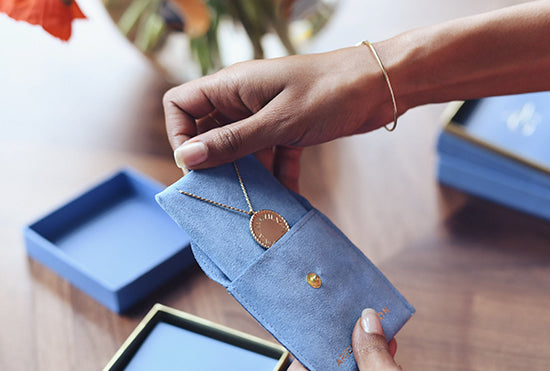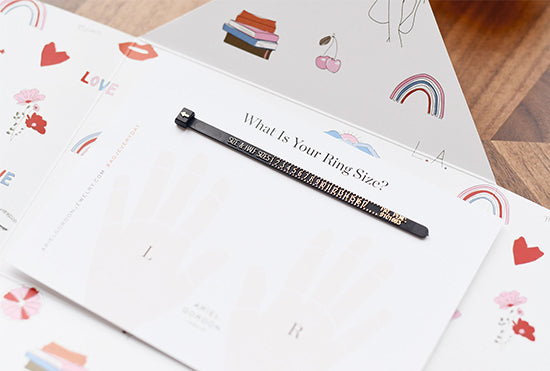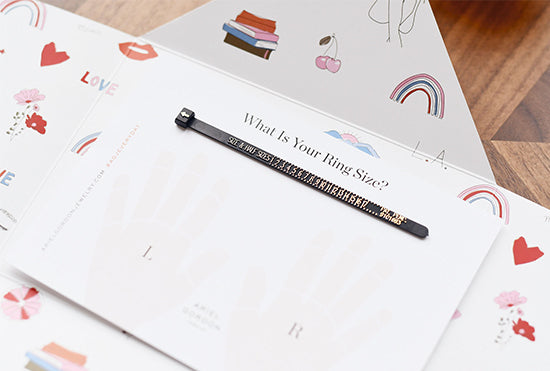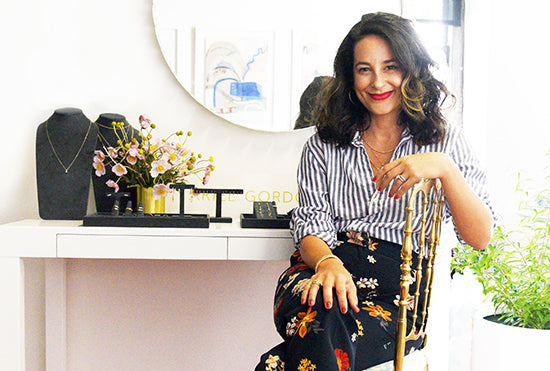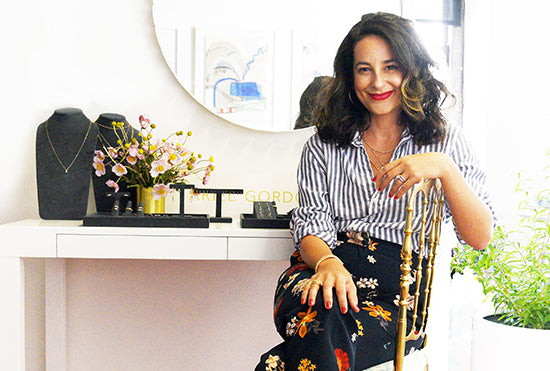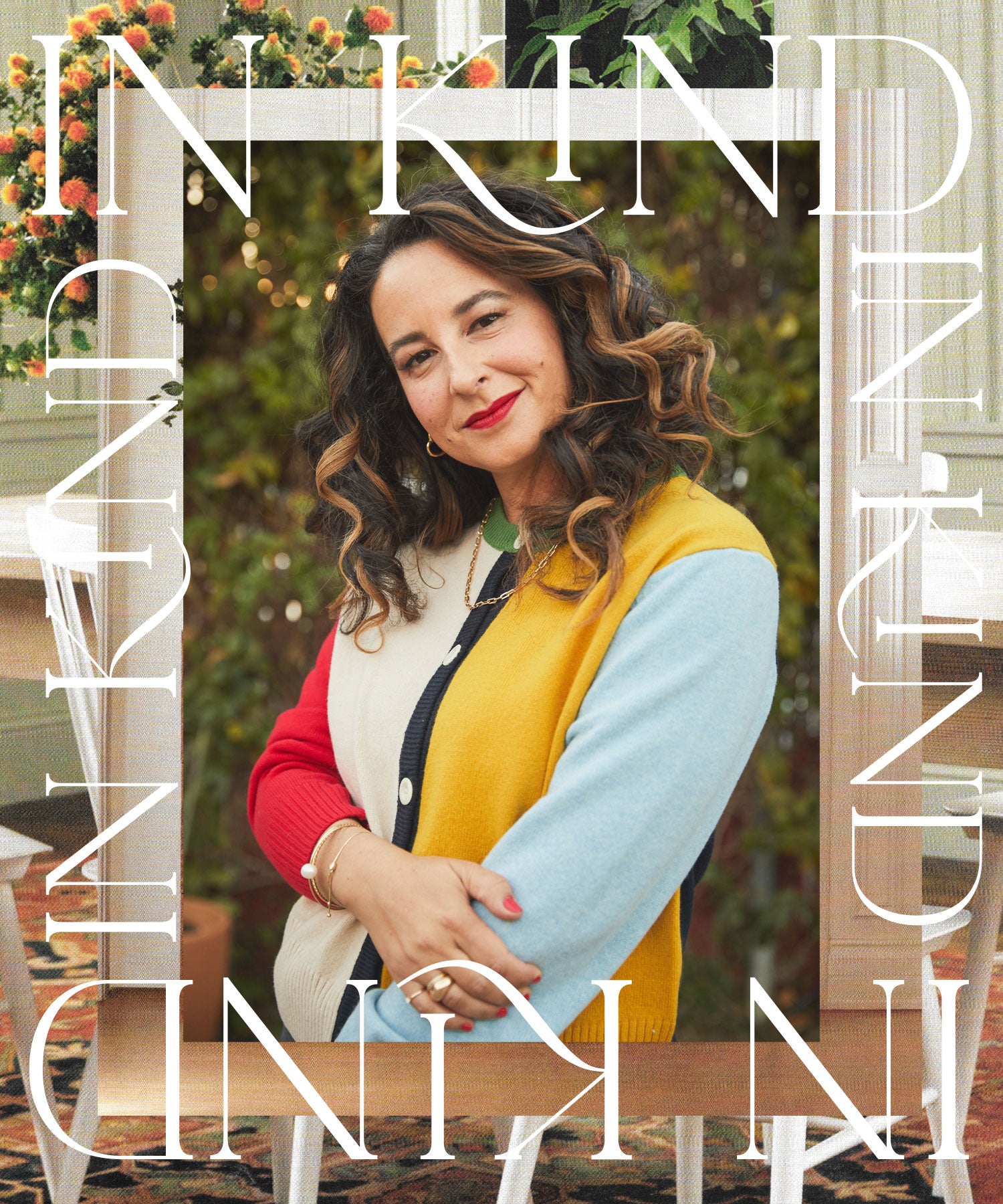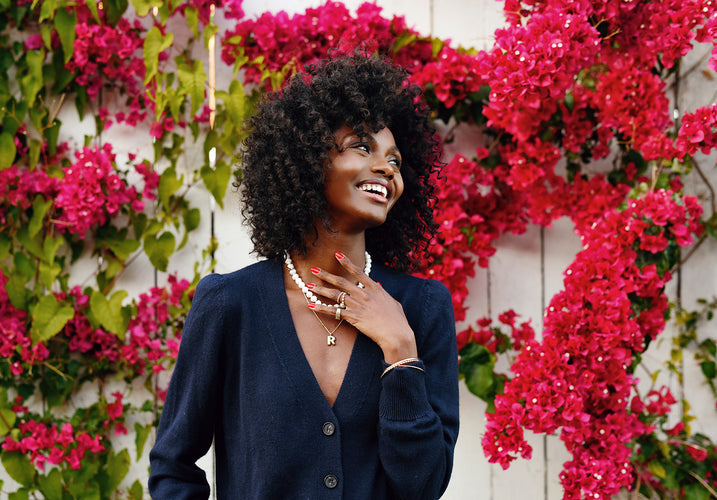|
|
As seen on In Kind…
Every good conversation starts with a single question. Whether it's wondering how, why, or what, it's the place we jump off from—and into the moments where all the good stuff happens..
We asked Ariel Gordon, founder of her eponymous (and celebrity-favorite) jewelry label, what it’s like when your business is also an extension of yourself.
Hannah: We spend so much time in our careers, and our businesses are such an extension of who we are. Yours is your namesake, but more so, it reflects who you are, too. How did you decide how much of yourself would be forward-facing and a part of your business in that way? Was it intentional from the get-go, or did it change over time?
Ariel: If you have an eponymous brand, you’re signing yourself up for that kind of exposure. It’s not so much that I'm a private person; I'm a pretty open book. I've talked publicly about how tricky it can be to be a mother and a business owner and personal things, like when my mom passed away and how that affected me as a woman and a daughter and a mother and a business owner. I took a season off when that happened because I was in the throes of that.
I'm also pretty political, and I have no problem talking publicly about what my political beliefs are, and I certainly get blowback from that. I get people responding to my political posts and the charities that I back and they say, “You know, we come to you for pretty jewelry. Keep your opinions to yourself.” And the truth is, “myself” is my jewelry. I'm not trying, nor do I want, to separate myself from my brand. It is an extension of me and my beliefs and my values. And so, respectfully, if those don't align with you and your values, feel free to buy other jewelry.
I feel like people have an inclination now to spend their dollars with brands whose values and ethos align with their own. Being a conscious consumer is something that people are more aware of now; [they’re] putting their dollars behind brands who align with their beliefs. .
I think a lot of my customers appreciate my transparency and that I will stand for causes that I believe in—or publicly speak out against politics that I don't believe in. I have a lot of friends who own bigger companies or who work for bigger companies, or friends of mine who are celebrities and they have to be more middle of the road because they have boards to be accountable to, or they're promoting a movie and they don't want blowback from something. They feel like they can't speak out publicly about what's going on in the news, and I don't have those limitations.
The flip side of that is that my marketing team is always like, “Can you post more pictures of yourself?” I was just in Tucson at the gem show, and they asked for photos so they could put together a “sourcing diary” to show what I’m wearing, what the design process looks like, etc. I'm the worst at documenting that, but that is the sort of content that always resonates because it is authentic and it is me. People want to see how the sausage gets made.
Hannah: It’s funny, because it becomes its own job. It adds another layer. It seems simple enough, but it does take effort.
Ariel: I don't want to do a shitty job. It's not like it needs to be this fully produced thing, but I also don’t want it to look too hacky—and there's only so many hours of the day.
Hannah: What's your favorite part of what you get to put out there?
Ariel: If I have enough bandwidth and can show behind the scenes of the design process, or sourcing trips, or when I have a photo shoot. I style the photo shoots myself: I produce and art direct them. I don't think people realize what a big undertaking they are, and how there are months and months of planning that goes into a three-day photo shoot.
Hannah: In talking about your values as a company and as a person, and being politically active and engaged, how do you imbue that in the rest of your company and the people who work for you? How, as a founder and a leader, do you take that on?
Ariel: I always try to partner with at least one, but usually two or three or four charities every year. We'll design an item and collaborate with them, and then we'll donate all the proceeds to the charity. I'm on the board of a couple of charities, and I feel really fortunate that [our] brand is at a point that it can give back. Even if we don't do a collaboration, we give donations to various charities, and I'm always looking for new charities that support mothers or women's issues.
A big one that I work with is I Am a Voter., because—I think after Covid—you realize that it's not just the top of the ballot that matters. It matters who your governor is; it matters who your mayor is. It matters who your school board is; all the way down the ballot matters.
I work a lot with This Is About Humanity, which is an organization that works to protect migrants who are trying to cross the US-Mexico border. Most of them are from Ecuador, Guatemala, and El Salvador. And they get stuck; the Trump administration kind of made this remain-in-Mexico policy. Now they're having to wait in Mexico for their hearings, and the state of the shelters is pretty abysmal. So we work to build new shelters, get them medical supplies and new tents, and help them get lawyers through the immigration process.
I grew up in San Diego, really close to the border, and a couple of my friends founded that charity, so that one hit pretty close to home. You wouldn't think that voting or human rights could be that polarizing, but I get blowback on that stuff all the time.
Hannah: What does activism look like in your office? What’s the office culture around this like?
Ariel: We're small. We're about eight people in the office, and I think everyone feels proud to work for a company that stands up for what we believe in and isn't just worried about the bottom line, not giving back to our communities.
Hannah: That makes sense. I think when you're navigating these things and working somewhere, you want to also feel like those things are talked about and part of the culture—if abortion rights are at stake, we’re not just donating money, everyone in the office is also talking about it, too.
Ariel: When the Texas abortion abortion ban happened, we all sat as a team and just took a minute to talk about it. Business as usual can't go on when the world is sort of melting around you. We needed to take a minute as a group to just process together; I think that’s so important. That was certainly going on during Covid. We would have check-ins with each other.
Hannah: With regard to the nature of the way we consume content and use Instagram to share success and excitement, there's obviously a lot of comparative culture that goes on. How do you tune that out and focus on what you're building and stay true to your overall mission?
Ariel: I think it's a little bit easier at the point where I am in my career. If I were starting out, I would have a lot more imposter syndrome, I think, but I feel pretty established at this point, and so I feel like there's enough to go around for everybody. Someone else's success doesn't mean that there's less success available to me, you know? Like, does X and Y and Z look super rad, and do I wish I had that? Maybe. But that doesn't mean that just because they have it now that I won't. I can make that as a goal for myself to work towards and motivate me in that way.
The WJA [Women’s Jewelry Association] has a mentorship program called the Jewelry Loop program that I’ve been a mentor with for a couple of years now. It's a half-a-year long program where emerging designers apply and get assigned a mentor, and then, ultimately, you help them build their first collection.
A lot of those designers—that's what they talk about at this stage. They’re looking at this brand or that brand and seeing how many Instagram followers or stores they sell to, or that they have more money to do big collections. And they think, How am I ever going to do that? How do I measure up? How do I, how do I, how do I?
Whenever I feel those feelings creeping in, I use that as motivation, because otherwise you just get frozen and you're like, Shit. I can’t. So when I get really daunted and overwhelmed like that, I use that as motivation. I break it down into a checklist, like, “If that's my goal, these are the steps one through 10 that I have to do to achieve that goal. I'm gonna work my ass off until I get it.” Then the funny thing is that once you reach that milestone, it kind of isn't as special anymore.
As a business owner and as an entrepreneur, you're always in this go, go, go mode. And unless you allow yourself a moment to pause and be reflective, to think, Look at what I just did, that was so rad, by the time you get to that finish line it’s already moved 20 feet down, and you're having to keep going and going and going. You haven't even really paused to be like, ”No, wait—look at what I just did. That was so amazing.” We hit a lot of our goals and are too busy to even realize it.
That's what happens as a business owner, especially if you're just starting out—there's just a never ending list of projects.
One thing that I tell people in the Jewelry Loop program is that nothing's ever really finished. You're never really done. It's like, ”Okay, you want to build a website. You want your product pages to look like this, your homepage to look like that. You want the pages to have this functionality.” It's not like you do those 15 things and then you never have to look at your website again. I'm forever evolving my website, adding some new functionality, changing the way this landing page looks, tweaking this, tweaking that, changing the way the video is. It’s never going to be finished. It's always a work in progress. So carve out enough space to kind of acknowledge the work that you've made and know that it's forever going to be evolving.
Hannah: You touched a little bit on imposter syndrome and that feeling. I think we all probably have some of it, but what would you say to someone who's kind of in the throes of it?
Ariel: Know that people are vain enough that they're only going to put the good shit out there. You're not seeing a full picture. Know that there is enough to go around for everybody. And just because someone else got it doesn't mean you can't get it. And use that to light your fire and help motivate you.
Hannah: What is the last business win you celebrated?
Ariel: Well, I recently relocated my company from Los Angeles to the Bay Area, and that was a really big decision for me. I mean, I've lived in LA forever and LA was a huge part of my identity, the brand's identity—the whole ethos of my brand is this made-in-LA energy.
My family moved up to the Bay Area five years ago to be closer to my husband's family, but my company was still in LA. I was just traveling back and forth, but then Covid hit and I couldn't travel back and forth. So that presented its own set of problems. And then my lease was up, and I was like, “Is it sustainable for the company or for me to sign another five year or 10 year lease on a studio that's in a city where I don't live?”
I think if there's one thing that the pandemic taught me and kind of taught all of us is that the things that you thought were immutable, the things that you thought were hard lines in the sand, can actually shift. And just because I had this idea that everything had to be in LA doesn't mean that it actually has to be that way.
The luxury of owning my own business is that I can change it. l still make 90 percent of my jewelry in LA. All of my vendors are still there, but my office team is now up here. I got this gorgeous new building, and I did a full build-out on it and decorated it. It was this pretty major undertaking and accomplishment that now I have everything headquartered up here with this gorgeous space. It has room for the company to grow, and it's also closer to my family and my kids. It just works better for the business and for me.
That felt like a very adult decision and a very gnarly undertaking that I'm super proud that I was able to pull off—for me as a business owner, a mother, a wife, and a friend.

